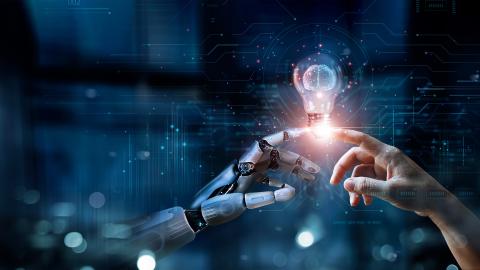Sponsored content: created in partnership with Duolingo.
AI is more than a passing trend. The International Monetary Fund estimates that almost 40 per cent of jobs around the world will be impacted by the technology, which will replace some roles and complement others. For students yet to start their career journey, it’s easy to see how statistics like these could be intimidating. But that would be to underestimate the opportunities that AI and automation are set to create for students, universities, industry and the entire world.
In the higher education space, AI holds great potential, from automating administrative tasks to personalising learning experiences. For international students, in particular, AI and automation could help tackle the unique challenges they face – from language barriers to cultural differences. For example, AI-based applications can offer customised content and language translation, boosting the accessibility of educational services.
The advantages of AI and automation will continue to be felt as graduates enter the workplace. Universities will increasingly have a responsibility to ensure that their students and staff are AI-literate to support both learning and employability. Making this abundantly clear, a recent Microsoft survey found that 82 per cent of business leaders believe their employees will need new skills to prepare for the growth of AI. This has obvious implications for industry and academia.
How AI and automation will reshape the jobs market
Although it is impossible to predict precisely how this technology will shape the future job market, there are several leading predictions:
- Goodbye to manual, repetitive tasks. Although AI is unlikely to lead to mass job losses, it will change the nature of the work expected of employees. Repetitive, manual tasks, such as data entry and scheduling, are likely to be automated – but that should be seen as a positive. With businesses leveraging AI, employees will gain time to focus on creative work that adds genuine value to an organisation.
- Reshaping recruitment. AI could greatly expand the talent pool available to recruiters. AI-driven translation tools, for example, can facilitate interviews and assessments across different languages, allowing businesses to scour the entire world when looking for their next hire. In an AI-powered world, talent, not language skills, will determine employability.
- Supercharging productivity. AI is set to take employee productivity to new heights. Virtual assistants, predictive analytics and task automation will streamline workflows. Individuals are likely to experience these productivity benefits from the very start of their careers – or even before it. University students are increasingly using AI tools to adapt curricula to their personal learning styles and source real-time solutions to problems, whether they concern language barriers or note-taking.
- Hello to new skills. AI will precipitate the need for new skills in the workplace. Workers – current or prospective – would do well to acquire them as soon as possible. According to the World Economic Forum's 2023 Future of Jobs Report, these skills include things like technological literacy, creative thinking, motivation and self-awareness. Higher education institutions that prioritise these skills are likely to see a higher proportion of their graduates in demand with employers.
- Preparing for the AI-driven workplace. Although the pace at which AI will reshape the workplace is set to be extremely fast, there are steps students and employees can take now to prepare: have an open mind, embrace innovation and adopt a lifelong approach to learning. That way, employees new and old will be ready for the workplace no matter what AI evolution brings.

Comments